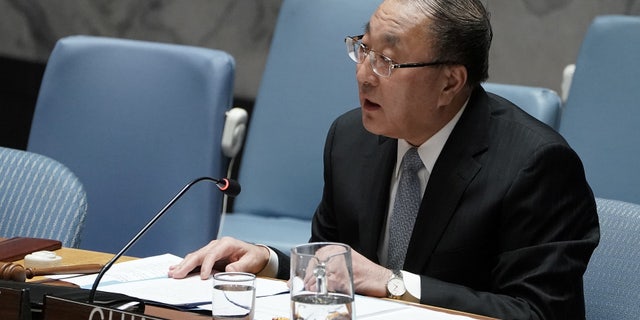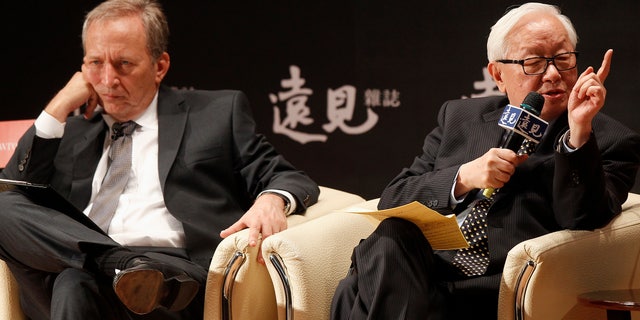NEWYou can now listen to Fox News articles!
EXCLUSIVE: Taiwan’s de facto consul general questioned the legitimacy of the United Nations, which continues to exclude the island nation at a time when it seeks to address its security concerns and better integrate itself as a vital part of the international community.
“It is disappointing to see the U.N. continue to misinterpret the U.N. Resolution 2758 as a legal basis for justifying its wrongful exclusion of Taiwan’s participation,” Ambassador James Lee, the director-general of the Taipei Economic and Cultural Office in New York and de facto consul general of Taiwan, told Fox News Digital. “Taiwan passport holders are not allowed to set foot at the U.N. premises simply because [of] their nationality.”
While unveiling a new billboard campaign in New York’s Time Square in time for this week’s United Nations General Assembly, Lee told Fox News Digital in an exclusive interview that the campaign is all about highlighting why Taiwan should be given access to the world body. The animated billboards proclaim: “Give Taiwan a voice for global good and global peace.”
“This discriminatory policy contravenes its own principle of leave no one behind, so I would say its legitimacy is also questionable,” he added.
China has increased its aggressive posturing toward Taiwan in recent months: the People’s Liberation Army (PLA) held drills near Taiwan — including a series of exercises that occurred in direct response to U.S. House Speaker Nancy Pelosi’s August visit to Taiwan — and Beijing has simulated attacks on U.S. warships in seeming preparation of a clash.
XI QUESTIONS PUTIN OVER ‘CONCERNS’ WITH WAR IN UKRAINE IN FACE-TO-FACE MEETING
President Biden has repeatedly stressed that the U.S. has made a commitment to defend Taiwan, even militarily, should China try to attack or seize the island.
Taiwanese then-Vice President Chen Chien-jen attends an event to campaign for Taiwan to be recognized as a participant in the United Nations and World Health Organization, in Taipei, Taiwan, March 10, 2018.
(Reuters/Tyrone Siu)
Experts say, therefore, that Taiwan will not take focus at this year’s U.N. General Assembly (UNGA). John Herbst, senior director of the Atlantic Council’s Eurasia Center and former U.S. ambassador to Ukraine, said it is “unlikely that Taiwan will loom large” at the assembly as it is “not in China’s or our interest.”
Ash Jain, director for democratic order with the Scowcroft Center for Strategy and Security, said during a forum Thursday that while Taiwan will not likely be part of the “formal agenda,” he would expect to hear world leaders “hint” at the conflict in speeches and for bilateral meetings to occur “on the sidelines.”
NEW PHILIPPINES PRESIDENT FIGHTING BACK AGAINST CHINA’S INCURSIONS
“The U.N. really isn’t the place to discuss an issue like Taiwan,” Jain said.
But Lee argued that the U.N.’s very purpose is to address an issue like Taiwan, saying the organization aims to “maintain international peace and security.”

Zhang Jun, China’s ambassador to the United Nations, speaks during a Security Council meeting at U.N. headquarters in New York on March 10, 2020.
(Reuters/Carlo Allegri)
“Taiwan, as a responsible member of the international community, will continue to exercise restraint in response to China’s provocation and continue to work with like-minded countries to uphold peace and security and stability of our region,” Lee said.
“At this stage, we only seek for meaningful participation,” he added.
Lee does not hold any illusions about the uphill struggle that Taiwan faces in an organization in which China holds so much influence, which he labeled as “malign” while Taiwan is “a force for good.”
“Now is the time to let Taiwan in and help,” he said.

Taiwan Semiconductor Manufacturing Co. founder Morris Chang, right, and Lawrence Summers, ex-director of the White House’s National Economic Council, attend a business forum in Taipei, Taiwan, on May 30, 2012.
(Reuters/Pichi Chuang)
Taiwan already plays a significant global role as a majority producer of semiconductors globally, supplying 63% of the market’s share compared to just 12% from the U.S. in 2019 and 16% from China in 2020.
CLICK HERE FOR THE FOX NEWS APP
Action against Taiwan would likely disrupt that supply chain and cause a number of knock-on effects. China experienced a shortage earlier this year, which caused a shortage in new cars and drove up prices in that market.